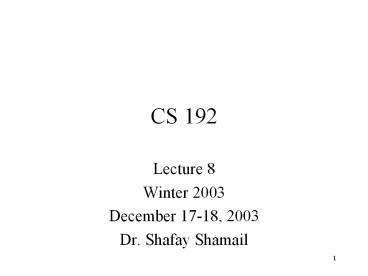CS 192 - PowerPoint PPT Presentation
1 / 14
Title: CS 192
1
CS 192
- Lecture 8
- Winter 2003
- December 17-18, 2003
- Dr. Shafay Shamail
2
The if Statement
- Its a selection or decision statement
- if (test-condition) statement
- test-condition is an expression that evaluates to
true or false - If the condition is true, then the statement will
execute otherwise not - if (10 lt 11) cout ltlt hello ltlt endl
- cout ltlt I am after if
- Can have a block of statements instead of just
one - Pitfall if(marks 100) cout ltlt Congrats!
- Write if(100 marks). Now compiler catches
single
3
The if else Statement
- Choice between two alternatives
- Pseudocode
- if(ltexpressiongt)
- lttrue_statementsgt
- else
- ltfalse_statementsgt
- If ltexpressiongt is TRUE (non-zero), then
lttrue_statementsgt are executed - If ltexpressiongt is FALSE (zero), then
ltfalse_statementsgt are executed
4
The if else Statement
- Example ATM Withdrawal program
- include ltiostream.hgt
- int main()
- int balance 10000
- int withdrawal
- cout ltlt "Please enter the withdrawal amount "
- cin gtgt withdrawal
- if(withdrawal lt balance)
- cout ltlt "Here is your money." ltlt endl
- else
- cout ltlt "Sorry, insufficient balance." ltltendl
- return 0
5
Nested ifs
- An if statement that is the target of another if
or an else - An else refers to the nearest if statement within
the same block that doesnt have an else - if(i)
- if(j) statement1
- if(k) statement2 // this if
- else statement3 // is associated with //
this else - else
- statement4 // associated with?
6
Nested ifs
- The ltstatementsgt inside the braces can contain
any valid C statements, including other if-else
statements! - if (withdrawal gt balance)
- cout ltlt "Insufficient funds." ltlt endl
- cout ltlt "Do you want to see your
balance?(y/n) " - cin gtgt answer
- if (answer 'y')
- cout ltlt "Your balance is "ltltbalanceltlt endl
- else
- cout ltlt "Ok then. "
- else
7
Nested ifs
- Another example
- include ltiostream.hgt
- int main()
- int a, b, c
- cout ltlt Enter three numbers a, b, c\n
- cin gtgt a gtgt b gtgt c
- if (ab)
- if(bc)
- cout ltlt a, b, c are equal\n
- else
- cout ltlt a and b are different\n
- return 0
- Let a2, bc3. Whats printed?
8
The if-else-if Construction
- More than 2 choices. if else is itself a
statement, so can follow an else - if (ch A)
- agrade //choice 1
- else
- if (ch B) //choice 2
- bgrade
- else
- SoSo //choice 3
- Easier to read format
- if (ch A)
- agrade //choice 1
- else if (ch B)
- bgrade //choice 2
- else
- SoSo //choice 3
9
The if-else-if Ladder
- Conditional expressions evaluated top-down The
first true conditions statements evaluated rest
of the ladder skipped - int num_credits
- coutltlt"Please enter workload "
- cingtgtnum_credits
- if(num_credits lt 0)
- cout ltlt "Come on, get real" ltlt endl
- else if (num_credits lt 12)
- cout ltlt "Part-time student" ltlt endl
- else if (num_credits lt 18)
- cout ltlt "Full-time student" ltlt endl
10
The switch Statement
- If a large number of choices that all depend on
one expressions value, better to use switch than
the if-else-if construct - switch (expression)
- case constant1
- statement(s)
- break
- case constant2
- statement(s)
- break
- default
- statement(s)
- break // not required
- expression must evaluate to an integer value
(includes characters) constant must be integer
(or character) constant
11
The switch Statement
- int main()
- int x1
- switch (x)
- case 0
- coutltlt"zero \n"
- break
- case 1
- coutltltone \n"
- break
- default
- coutltltsorry! \n"
- break
- return 0
- char c M switch(c). What case will match
now?
12
The switch Statement
- int main()
- int x1
- switch (x)
- case 0
- coutltlt"zero \n"
- break
- case 1
- coutltltone \n"
- default
- coutltltsorry! \n
- return 0
- break necessary to exit from switch, otherwise
all subsequent executed
13
The switch Statement
- break and default are optional but important.
- No two cases can have same value
- Can have same statements for multiple cases
- int medal
- coutltlt"Enter your rank in class "
- cingtgtmedal
- switch (medal)
- case 1 case 2 case 3
- coutltlt"Wow! Medal winner \n"
- break
- default
- coutltlt"Better luck next time \n"
14
The switch Statement
- int main()
- int i
- for(i0 ilt5 i)
- switch(i)
- case 0 cout ltlt "less than 1\n"
- case 1 cout ltlt "less than 2\n"
- case 2 cout ltlt "less than 3\n"
- case 3 cout ltlt "less than 4\n"
- case 4 cout ltlt "less than 5\n"
- cout ltlt '\n'
- return 0
- Output?































